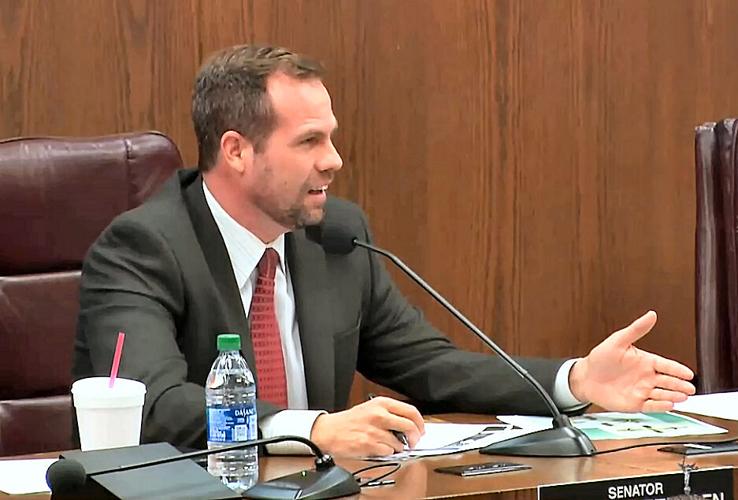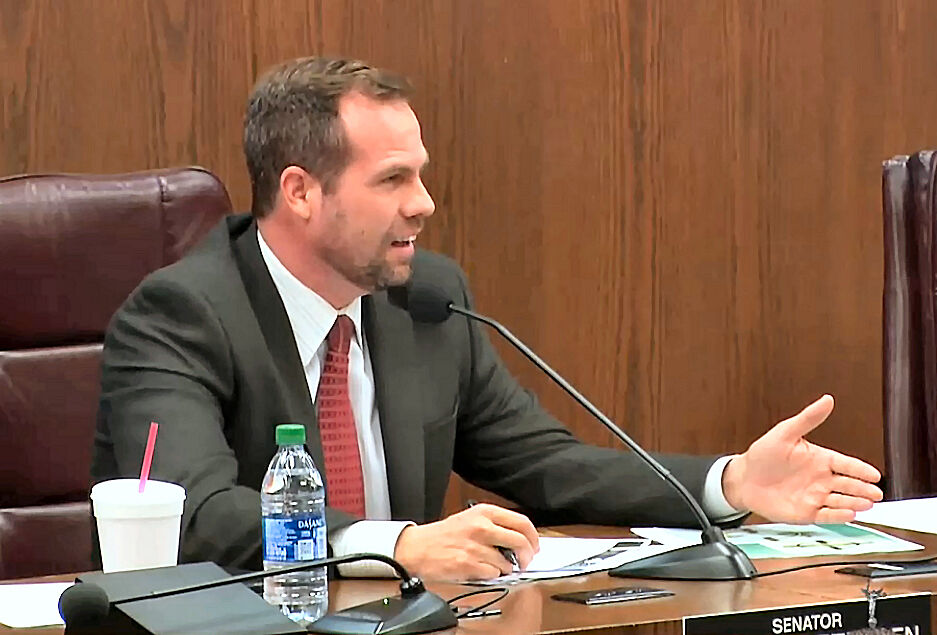PHOENIX — The reason Arizona is blocking two transgender girls from participating in girls’ sports is because they have a medical condition, the state’s top GOP legislative leaders say in a new court argument.
That rationale means the state law isn’t discriminatory, they also argue.
In a new court filing, the attorney for Senate President Warren Petersen of Gilbert and House Speaker Ben Toma of Peoria asks federal Judge Jennifer Zipps to delay an order she issued last week allowing two transgender girls who sued, including a Tucsonan, to take part in their schools’ girls’ sports teams. Petersen and Toma want the state to keep barring their participation.
“Their exclusion from girls’ teams is due to a medical condition, not the states’ sex-based separation of sports teams,” wrote the legislators’ attorney, Justin Smith, making the new argument.
The basis for that claim is the finding by Zipps that the two transgender girls have “gender dysphoria.’’

Rep. Ben Toma
That is generally defined as an individual’s sense of mismatch between biological sex — the sex assigned at birth — and gender identity. The judge said denying transgender girls the opportunity to participate in sports with other girls can be harmful, citing high rates of suicide in the transgender community.
But Smith said that diagnosis cannot become the basis to allow those born male to participate in girls’ sports.
“It is not uncommon for biological males to have medical conditions that prevent them from participating on male sports teams,’’ he said. “And those males suffer the same injury of being unable to participate in sports.’’
Lawmakers: Not fair to allow participation
The GOP legislative leaders also contend Zipps got it wrong in concluding that “biological boys’’ who have not reached puberty have no inherent advantage over girls of the same age.
“As virtually any elementary-school sports coach can attest, there is a competitive advantage for boys over girls before puberty, and there is not a scintilla of evidence that puberty blockers and hormone therapy eliminate this advantage,’’ Smith wrote.
Zipps, in her ruling last week, said that’s not what the evidence shows.
Hanging in the balance is Zipps’ ruling immediately barring the state from enforcing the 2022 law in the case of the two transgender plaintiffs. One attends The Gregory School, a private school in Tucson. The other is set to attend Aprende Middle School in Kyrene School District.
The judge’s order was not final; it permits the state to seek a full-blown trial on the issue.
But Smith said it’s not fair to allow the two transgender girls to participate in the meantime.
Neither girl has reached puberty
The 2022 law says public schools and any private schools that compete against them must designate their interscholastic and intramural sports strictly as male, female or coed.
It spells out that teams designated for women or girls “may not be open to students of the male sex,’’ which it says is defined as the “biological sex’’ of the participant.
In filing suit, the National Center for Lesbian Rights and other attorneys did not seek to overturn the 2022 law entirely and entitle all transgender girls to participate on girls’ teams.
Instead they argued that each bid by a transgender girl should be considered individually. And in this case, they said that since neither girl is experiencing puberty — one is too young and the other is on puberty blockers — they should be allowed to play with and against other girls.
Zipps agreed. She cited the policy of the Arizona Interscholastic Association, which has approved a handful of such requests.
‘Will displace biological girls’
The judge also cited the social, emotional and physical benefits from participation in sports.
Smith, in his bid to delay the order, said that doesn’t just work one way.
“Needless to say, these same benefits of participating in competitive sports … are just as applicable to biological girls as transgender girls,’’ the legislators’ attorney wrote.
Competitive sports “are zero-sum by their very nature,” he said. That means, by definition, he said, that each team position or other slot taken by a transgender girl “will displace biological girls.”
“In every volleyball and basketball game, a plaintiff getting coveted playing time displaces a biological girl who thus does not get that playing time,’’ Smith said.
“Cross-country meets are scored by ordering all runners who participate from first to last,’’ he continued. “That means that a transgender runner who takes any place but last displaces every biological girl who finishes after the transgender runner by at least one place.’’
Title IX issues debated
Smith also said Zipps was wrong to consider only the question of whether transgender girls who have not reached puberty have an inherent physical advantage. He said the judge should have looked at why lawmakers adopted the whole ban, including issues of post-pubescent transgender girls, not just the effect of the law on these two plaintiffs.
Smith also is taking issue with the judge’s ruling that the 2022 law violates Title IX, the federal statute that prohibits discrimination on the basis of sex in sports.
“Title IX, from its inception, is understood to specifically authorize the separation of sports teams based on biological sex — exactly what the act does,’’ he said.
He specifically cited one court ruling that said the act is designed “to increase opportunities for women and girls in athletics.’’
None of that may help Petersen and Toma in their bid to allow the state to enforce the law.
Much of Zipps’ order is based on the premise that transgender girls — and, specifically, in this case where they have not entered puberty — are in fact girls for purposes of participating in sports.
“It would be psychologically damaging for a transgender girl to be banned from playing school sports on equal terms with other girls,’’ the judge wrote.
Get your morning recap of today's local news and read the full stories here: http://tucne.ws/morning






